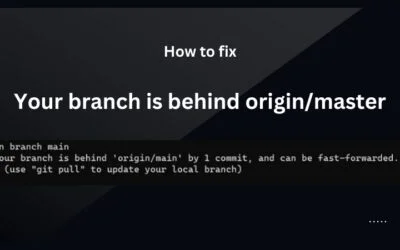If you’ve ever encountered the error message “Your Local Changes To The Following Files Would Be Overwritten By Merge” while using Git, you’re not alone.
This common error occurs when you attempt to merge branches or pull changes from a remote repository, but Git detects that you have uncommitted changes in your local repository.
In this blog post, we’ll explain why this error occurs and provide step-by-step guidance on how to resolve it, either by committing your changes or stashing them.
Contents
Understanding the Error:
When Git displays the error message “Your Local Changes To The Following Files Would Be Overwritten By Merge,” it means that the changes you’ve made to certain files conflict with the changes that would be introduced during the merge or pull operation. Git is designed to prevent data loss, so it refuses to perform the merge until you handle the conflicting changes.
Resolving the Error:
To resolve the “Your Local Changes…” error, you have two options: commit your changes or stash them. Let’s explore both options in detail.
Committing Your Changes:
Review your local changes:
Use the git status command to see which files have uncommitted changes. It will display a list of modified files and their status.
Stage your changes:
Use the git add command to stage the changes you want to commit. Alternatively, you can use git add . to stage all changes.
Commit your changes:
Execute the git commit -m "Your commit message" command to create a new commit with your changes.
Retry the merge:
After committing your changes, attempt the merge or pull operation again using the appropriate Git command.
Stashing Your Changes:
Review your local changes:
Similar to the first option, use git status to identify the files with uncommitted changes.
Stash your changes:
Execute the git stash command to save your changes in a temporary area. Git will revert your working directory to the state of the last commit, allowing you to perform the merge.
Merge or pull changes:
Once you’ve stashed your changes, you can proceed with the merge or pull operation using the necessary Git command.
Retrieve your stashed changes:
After the merge is complete, use git stash apply to reapply your stashed changes. This will reintegrate your modifications into the working directory.
Conclusion:
Encountering the “Your Local Changes To The Following Files Would Be Overwritten By Merge” error message in Git is a common occurrence when you have uncommitted changes in your local repository.
However, with the steps outlined in this blog post, you now have a clear understanding of how to resolve this error.
Whether you choose to commit your changes or stash them temporarily, you can confidently navigate Git’s merging process and ensure your modifications are integrated correctly.
Happy coding!






0 Comments